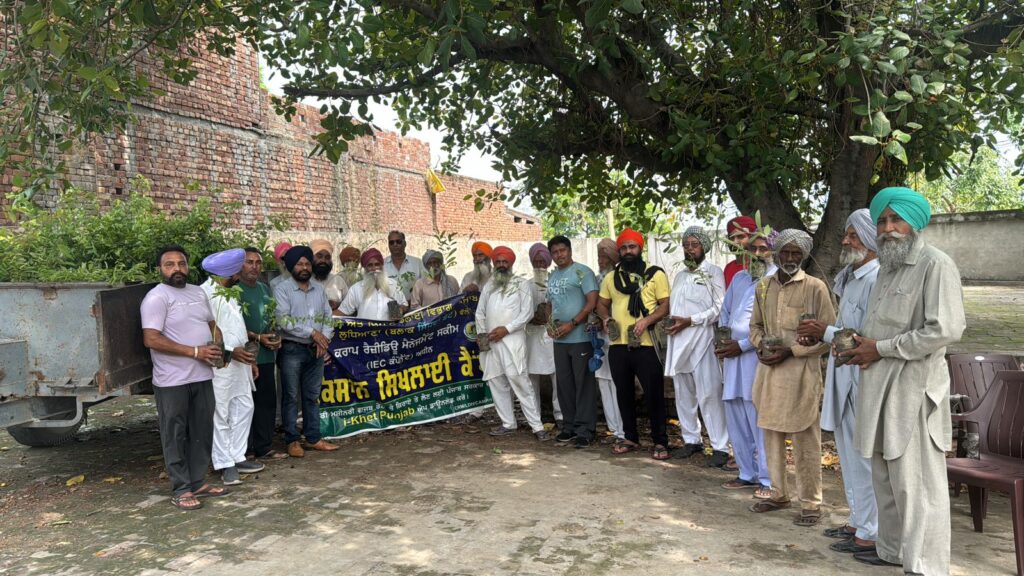
Environmental Farmer Training Camp at Village Raowal Ludhiana
Introduction
In a bid to promote sustainable agriculture, the Agriculture Department organized an Environmental Farmer Training Camp at Village Raowal Ludhiana. This initiative aims to educate farmers on eco-friendly farming techniques. The camp is a crucial step towards creating awareness about the importance of environmental farming, which can lead to healthier crops, soil, and water resources.
Background of Village Raowal Ludhiana
Village Raowal Ludhiana, located in the heart of Punjab, is known for its rich agricultural heritage. With a population deeply rooted in farming, the village is an ideal location for such training camps. The majority of residents depend on agriculture for their livelihood, making it essential to adopt sustainable practices to ensure long-term productivity and environmental health.
Purpose of the Training Camp
The main objective of the training camp is to equip farmers with the knowledge and skills required for sustainable farming. By focusing on environmental farming techniques, the camp aims to reduce the negative impact of conventional farming on the environment. The target audience includes local farmers, agricultural students, and community leaders who can further disseminate the knowledge gained.
Organizers of the Camp
The Agriculture Department played an important role in organizing this camp. Collaborating with local agricultural universities and non-profit organizations, the department ensured a comprehensive curriculum was developed. These partnerships brought in experts from various fields to provide in-depth training to the participants.

Key Topics Covered
Sustainable Farming Practices
Participants learned about sustainable farming practices that are not only eco-friendly but also cost-effective. These practices help in maintaining soil fertility and reducing the dependency on chemical fertilizers and pesticides.
Soil Health and Conservation
Understanding soil health is fundamental to sustainable farming. The camp covered techniques for maintaining soil structure and fertility, such as crop rotation, green manure, and composting.
Water Management
Efficient water management is crucial in farming, especially in regions prone to water scarcity. Farmers were taught methods like drip irrigation, rainwater harvesting, and the use of drought-resistant crops.
Organic Farming Techniques
Organic farming avoids synthetic inputs and focuses on natural processes. The camp provided insights into organic pest control, the use of organic fertilizers, and the benefits of organic certification.
Breakdown of the Camp
Introduction and Welcome
The camp began with a warm welcome and an overview of the training program. Participants were introduced to the importance of sustainable farming and what to expect in the coming days.
Soil Health and Conservation Techniques
The next part was focused on soil health. Experts explained various soil conservation techniques and the importance of maintaining soil fertility for long-term agricultural productivity.
Water Management Strategies
Water management was the highlight of the next section. Participants learned about efficient irrigation systems, water conservation methods, and the significance of water management in sustainable farming.
Organic Farming Methods
Organic farming methods were discussed after water management strategies. Trainers provided detailed information on organic practices, including the preparation and application of organic fertilizers and pest control solutions.
Hands-on Practice and Q&A Session
The topic included hands-on practice sessions where participants applied what they had learned. This was followed by a Q&A session, allowing participants to clarify their doubts and gain further insights from the experts.
Expert Speakers and Trainers
The camp featured a range of expert speakers and trainers, including agricultural experts, environmentalists, and experienced organic farmers. These professionals shared their knowledge and provided practical advice based on their extensive experience.
Interactive Sessions and Activities
To enhance learning, the camp included several interactive sessions and activities. Group discussions allowed participants to share their experiences and learn from each other. Practical demonstrations helped them understand the application of various techniques.
Benefits for the Participants
The training camp offered numerous benefits to the participants. They gained valuable knowledge about sustainable farming practices and acquired practical skills that can be implemented in their fields. This not only helps in improving crop yields but also in preserving the environment.
Feedback from the Participants
Participants provided positive feedback about the camp. They appreciated the comprehensive curriculum and the expertise of the trainers. Many expressed their eagerness to implement the new techniques in their farming practices.
Challenges Faced During the Camp
Despite its success, the camp faced a few challenges. Logistical issues such as transportation and accommodation for participants from distant areas were significant hurdles. Additionally, keeping the participants engaged throughout the sessions required considerable effort from the organizers.
Success Stories and Case Studies
The camp included several success stories and case studies of farmers who had already benefited from sustainable farming practices. These real-life examples served as motivation for the participants, showing them the tangible benefits of adopting eco-friendly techniques.
Future Plans
Following the success of this camp, the Agriculture Department plans to organize similar training sessions in other villages. The long-term goal is to create a network of environmentally conscious farmers who can lead the way in sustainable agriculture.
Impact on the Local Community
The training camp had a significant impact on the local community. It not only educated farmers but also created awareness about the importance of environmental conservation. This initiative is expected to lead to economic benefits through improved crop yields and reduced input costs, along with environmental improvements.
Conclusion
The Environmental Farmer Training Camp at Village Raowal Ludhiana was a resounding success. It provided valuable knowledge and practical skills to local farmers, promoting sustainable agriculture practices. The camp’s impact on the community is expected to be long-lasting, paving the way for a more sustainable and prosperous agricultural future.
FAQs
What is the main focus of the training camp?
The main focus of the training camp is to educate farmers on sustainable and environmentally friendly farming practices.
Who can attend these camps?
These camps are open to local farmers, agricultural students, and community leaders interested in sustainable agriculture.
How often are these camps held?
The frequency of the camps depends on the Agriculture Department’s schedule, but they aim to organize them regularly in different villages.
What are the benefits of attending the camp?
Participants gain valuable knowledge about sustainable farming, practical skills, and the opportunity to learn from experts and peers.
How can one register for the next camp?
Interested individuals can register through the Agriculture Department’s official website or contact local agricultural offices for more information.


